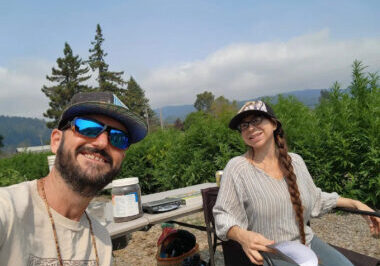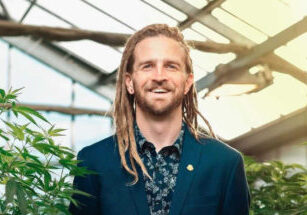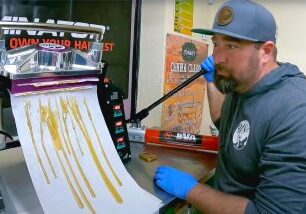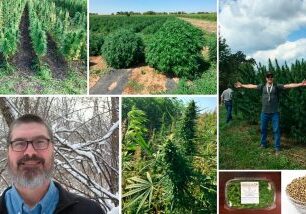In this episode we chat with Jeremy Schlottig, founder of 10 Dollar Carts and co-founder of Anthology. Jeremy tells us all about delta-8 THC and how he turned a Reddit post into a successful business!
Our hosts for this episode are Reed Preston, founder of Preston Hemp Co, and Dana Mosman, co-founder of Triminator.
Transcript
Reed Preston: Welcome to the Own Your Harvest podcast. This is our first episode of our newly launched podcast series. I’m Reed Preston, the founder of Preston Hemp Co and an ambassador for Triminator. I’ll be hosting the series along with our Triminator co-founder Dana Mosman.
This episode, we’re going to be chatting with Jeremy Schlottig from 10DC, who among other things was one of the first to launch a line of Delta-8 cartridges, also has a number of other ventures in the cannabis and hemp space.
Dana Mosman: Awesome. Yeah. Thanks for the intro, Reed. Super excited to talk to Jeremy. You know, I always love a good business story and Jeremy has a really interesting background and an intriguing sort of business story that I think will be interesting to the listeners. Obviously, you’ve got some significant ups and downs just like most of the hemp market with the regulatory environment. So I’m excited to have him get into the details on that one.
Jeremy Schlottig: Oh yes. It has been interesting.
Reed Preston: Very interesting. I’ve known Jeremy for a couple of years now, and I always enjoy chatting with him about what’s going on in the industry. He’s done some really great work in the extract world on both the cannabis and hemp side. So really stoked to have him on here.
Jeremy Schlottig: Yeah. Thanks for having me, you guys.
Dana Mosman: Yeah. Thanks for coming on. It’s great to have you. And one thing I love about our podcast is – we were talking about it before the show a little bit, Jeremy – but I love, you know, like kind of sharing info across the market I guess, or the industry as a whole. Like some things we know in the west they don’t know in the east and some things in the east, they, you know, they don’t know or vice versa basically. Right?
So it’s always cool. And, and especially as you have new markets, You know, New Zealand is getting into hemp, and the UK is getting into hemp, and Europe’s getting into hemp. We talked about some of that. It’s cool for those guys to hear what, you know, may be old news to us here in Oregon or Colorado, California. But yeah, it’s great to share it.
So yeah, I’ll just give a little bit of background on Jeremy. Basically a southern Oregon native. Got involved in the industry. Started a first rec facility in 2019 and then got involved in hemp, had a hemp farm, sort of the natural evolution that we’ve heard before. But then in 2020 did something that not a lot of people were doing and saw a big opportunity when he started 10DollarsCartridge.com, which sold Delta-8 cartridges direct to consumers. So I’ll finally let you talk, Jeremy. So thanks for joining us and welcome to the show.
Jeremy Schlottig: Yeah, man. Thanks again for having me. And I did just see a big opportunity with the whole Delta-8 stuff. Cause I was making it before it even got popular. No one even knew about it yet. And uh, and then when I got online, the actual genesis of 10DC was to just sell CBD carts, one mil CBD cartridges for 10 bucks. Then I got online and started to do some market research. You know, people were selling carts for 55, 60 bucks a pop. And it’s like, I know that the wholesale price was still a little bit higher last year, but it’s like the wholesale price on liters was $2000 a liter. So it’s $2 an input gram plus a $2 cartridge, you know, you’re, you’re into your cartridge, 4 bucks. Um, so I just saw a huge hole in the market. And actually was going to do 1mil D8 carts for $10. But after doing that market research, I’m like, man, I’m kind of shooting myself in the foot here and people are going to be really skeptical.
So why not do half grams for $10 and fulls for $20? And that went amazing. You know, definitely had to jump some barriers as far as people just considering it a low-quality product, because it was so much cheaper. But like really, at the end of the day, people are kind of just buying packaging and imaging when they’re, you know, spending $50 for something that costs $4 to make.
So I’ve always just really thought that, especially in the CBD space, without pricing had dropped, like the customers were getting the shit end of the stick. And then the wholesalers also were as well. Cause you know, they’re selling stuff, basically a cost. And then the person that eventually gets it to the consumer’s the one making all the margin. So I figured cut out the middleman and just go straight to consumer.
Dana Mosman: Yeah. Definitely. So many like direct-to-consumer brands kind of emerged probably, sorta simultaneous too. So maybe a little inspiration, like the Shavers Direct and all that. Right?
Jeremy Schlottig: Mm hmm. Yep. And we actually, we kind of copied that a little bit with just, you know, we have a little monthly goodie box that we do, and it was actually pretty cool though, to drop on 10DC because it really just crashed the whole market. A lot of other vendors had to start lowering their prices and then, you know, now consumers are able to get high and not completely just spend their whole paycheck on it.
Dana Mosman: Right.
Reed Preston: Yeah. Did you get some backlash from that, Jeremy, for many other companies, when you came out with some Ten Dollar Cartridges?
Jeremy Schlottig: Definitely like my first IG got reported and shut down. Someone was like making a fake Twitter account with my name and just trying to, like, I think start shit between me and some other companies. And they were getting on the Future 4200 forums and just kind of hating on the whole D8 market. But that kind of fell off really quickly. Like I noticed if I don’t feed the fires of that and just kind of keep my head down and do my work, all that shit just falls to the wayside.
Reed Preston: Right.
Jeremy Schlottig: It’s almost like they’re just trying to hook you and fish you into their drama shit.
Dana Mosman: Once you have enough credibility too, and like, people like the product, right? Like it sort of self polices. Like, we’ve had a lot of that on the Triminator side where people will come on and kind of like hate on mechanical trimming or whatever, and then when enough people have experience with the product, they’re like, “yeah, that’s fine you feel that way, but this is a good product.” Right? So I imagine something similar happens for you, especially being so early in this.
Jeremy Schlottig: Exactly. And then definitely there. Well, there was an issue. I was buying what I thought was C cells from a supplier in China, but they happened to be fake C cells. And, uh, I definitely had the real C cell branding on my stuff and there was a whole bunch of shit getting thrown on Reddit. And, uh, instead of just pulling everything and trying to like sidestep it, I just owned it fully. And it’s like, yeah, I did the research. These actually are fake C cells. And I just threw a, not a real C cell fire sale and just liquidated all the product and, you know, just was very upfront about what it was to customers.
It’s actually kind of interesting. It actually drove a lot more traffic and a lot more business to the website, having our brand at the top of the subreddit saying, “Vendor warning. Don’t buy from them.” But all it did was just drive more traffic.
Dana Mosman: Yeah, I mean, especially ‘cause you were transparent, right?
Jeremy Schlottig: Yeah.
Reed Preston: No, I was just going to say that’s similar to, you know, our latest blog posts, which I’m not sure if that’ll be out when we upload this podcast, but we’re doing a blog post on bucking and just like the reality of it, you know, using a bucking machine verses, you know, just hand bucking. So just being transparent with your customers is a huge thing. In any industry, especially in this one, you know, where, you know you’re not getting complete honesty out of everyone a lot of the time.
Jeremy Schlottig: Yeah. That actually brings something up I would like to talk to you and Dana about – maybe off air. But a Schuchat bucket that we’ve been making on our farms for the last few years that I feel like it blows every bucking machine, completely out of the water and it would be extremely cheap to manufacture. And that being an item sold with Triminators would probably go really, really well.
Reed Preston: And we can chat about that another time, but, um, we do have a, we do have a question here from Instagram. I think it’s a pretty important one given the topic is Delta-8 here. What’s the difference between Delta-8 THC and Delta-9 THC?
Jeremy Schlottig: So I don’t know if I’m really qualified to comment on this. Like as an actual, I would call myself a stoner scientist. Like I have no real chemistry background. So I know aside from, I believe it’s just one carbon chain different than Delta-9 THC, but the way I always explain it to people is it’s kind of like diet weed. I think Delta-8 is great for people that, you know, aren’t heavy D9 users because with cannabis being illegal for so long and THC being the active molecule, all the breeders were just trying to increase THC percentages. And although that’s really nice, it definitely, D9 increases your heart rate a lot. And then a lot of people might not know how to deal with that like anxious feeling. And then they kind of tailspin and they’re like, “I don’t like weed at all. Like it makes me nervous and my heartbeat too fast.”
Delta-8 is a really nice intro. Cause you can, you can get high and get those analgesic effects, but you don’t get that same kind of like crippling anxiety if you were to take a big dab or a big bong hit, or, you know, you’re a weed-smoking virgin and take a big hit off a cartridge. And uh, so yeah, I don’t know necessarily the chemical property differences, but for people that aren’t everyday cannabis users, I think that they’d be hard-pressed to even tell the difference between D8 and D9. It’s just kind of like a nice mellow Sativa high versus like some garlic cookies that’s just going to put you on your butt.
Dana Mosman: Uh-huh, yeah, obviously a lot of people know about D8 now, but like tell us how you kinda came up with the idea and then kind of vetted it a little bit, keep referring to Reddit. And I’d love to hear that story.
Jeremy Schlottig: Yeah. So I mean, years ago, actually, there was a lot of – just when I was learning how to make distillate and trying to understand everything, you know, everyone is really adamant about it being super-duper, light clear. And, uh, when you’re making distillate from especially oxidized old cannabis flower, it comes out pretty orange or almost red.
So just experimenting with putting different carbons and clays inside the boiling flask when you distill, you know, like you get a, a lot more of a clear, transparent product. But I think it was 2017, 2018, a lot of the labs didn’t even have standards for Delta-8 yet. And so I’d send stuff in for testing, you know, and it would, it would come back 40% D9. And then maybe like 50% total cannabinoids, but there would be a giant mystery peak in the middle of the chromograph. And it’s definitely saying that there’s something there, but they didn’t even have a standard to test for it. And so I kinda got sick of trying to explain that to people I was processing for and just really went into different filtration methods.
You can still kind of get that light color without doing the conversion. But really when the conversion started to get big is after that hemp harvest in 2019, because as everyone knows, the CBD oil market just crashed considerably. And finally, D8 was getting a lot more recognized because a lot of people were going for those water clear products, but, you know, it’s showing almost no cannabinoids in there.
If you have a full conversion from CBD or D9 to Delta-8. So once I saw that they were actually testing for D8 and that you could convert CBD oil into it, I just saw a humongous opportunity there. And instead of the whole project with the farm, we tried to launch a hemp farm along with doing the rec brand and thought that it would be a really good way to get broad, nationwide exposure. But oftentimes, my eyes are a lot bigger than my stomach, and just did not have the bandwidth to run every day. We spent way too much money on processing equipment that wasn’t even able to get up and running in the time that we needed, and it just kind of started to fall through the cracks, but we were able to, you know, still get our cash flow with the bulk Delta-8.
But then I guess, like I said, it was just too much and just kind of completely dropped the project with the partners that we had, because it was just, it was pulling too much away from the other good thing with the whole rec facilities. So got out of that for a little while. You know, just as time goes on, I’ve always wanted to have an e-commerce business, but you can’t just sell weed online. And then I’m like, oh, well there’s this Delta-8 thing. That’s pretty much like weed. So let let’s give that a shot.
Dana Mosman: Yeah, totally.
Jeremy Schlottig: And, uh, actually the first site that I built was DietWeedShop.com. I don’t think Square really liked the name. So that got shut down. Haha.
Dana Mosman: Segue into another question. Like, how do you think it kind of competes or co-exists with, uh, you know, traditional THC and like, where do you think that’s going if you look at the whole market, right?
Jeremy Schlottig: Yeah. So I really don’t know ‘cause I know with everything that’s going on with the PACT Act and stuff getting passed in the COVID bill, there are some forces in play trying to regulate it heavier. Because it really is like, it’s wide open now. Anyone can open up a CBD shop in almost any state and then fill it with a product that is technically federally legal right now where Delta-9 is still federally illegal.
So a lot of people are really optimistic that this current administration is going to legalize cannabis, but just from what I’ve seen and what I feel, I really don’t think that’s in the short-term forecast. So I think Delta-8 and D9 will still just be operating in parallel to each other instead of overlapping.
And someday I do see there being a huge market for D8 products and dispensaries as budtenders get more educated and as the consumer base gets more educated. There’s a lot of people just going into the store right now, looking for the highest THC percentage. And then finally people are paying a little bit more attention to the terpenes and actually what the effect might be versus like, I just want to get as high as I possibly can.
So I think as we develop into more of like a medical model than just like. It’s kind of sad. Like, it’s kind of being regulated like liquor. People are treating it just, like, as something to alter their consciousness instead of the medicinal effects. So I think as we kind of come back home to like, “wow, cannabis actually is a medicine and we should be sharing it with the people”, then people will be going for that whole wide array of, you know, CBN CBG CBD Delta-8. But I don’t see it overlap anytime soon, because in states where D9 is legal, like we don’t sell near as much as we do in states where, you know, cannabis is illegal.
Dana Mosman: Yeah. How do you think – I mean, I hear that a lot from people who have been in the industry, like “I wish that the consumer was more educated. I wish that like everyone knew more about the benefits and not just, ‘Let’s get high’.” – How do you think, as someone representing a brand, like, how do you hope to communicate that? Or what do you do? Or what do you think the fastest path to that is from like an industry that cares, right? What do you think needs to happen?
Jeremy Schlottig: Yeah, so I think I’ve really been working on developing my storytelling skills and also, we’ve talked about it a lot just about doing different blogs and educational videos. And there is a lot of it out there. But one thing that we did when the first kind of DEA tried to ban Delta-8, we submitted a request for people to submit content and how Delta-8 has helped their lives. I was completely shocked by the response because we were getting videos from older men and women saying how much it’s helped like just with them being able to eat more and just feel better. And then also people with crippling anxiety or depression and it really helping uplift them. So I’ve been working on with the team to try and get all those videos uploaded to a page and just start doing more of a content push about the actual benefits about it, instead of like a lot of what you see online is like hot girls smoking weed at the beach, or, you know, going on hikes.
And so I think just a lot of content specifically designed about the health benefits and you know, maybe some YouTube videos about how to cook with it, the different benefits of eating it versus smoking it because I’m not, like I said, I’m not really qualified on the science behind everything, but I do believe that Delta-8 converts to the same metabolite as Delta-9 in your liver. So people eating it definitely get like a really strong effect from it. You know, helps them eat. And I know there’s a lot of potential with cancer research and Delta-8 too. So I just think it’s a time thing, you know, we’ve been so brainwashed for decades, a whole generation thinks it’s the devil’s lettuce, you know, so we’ve got to turn that all around and it’s going to take time.
Reed Preston: Yeah. Back to that, like how, uh, Delta-9 and Delta-8 coexist. Have you heard anything about like, you know, certain processors and you know, dispensaries and stuff cutting carts with Delta-8 and Delta-9 on the rec market? Have you heard anything about that at all?
Jeremy Schlottig: So, I haven’t. I know there are some D-8 products in dispensaries and I specifically haven’t heard that. Because with everything being tested, you know, like it’s going to have to say whether it’s D8 or D9 in the cartridge itself. But I do think that there is a great market for those combination products. Like, well, you know, I can’t confirm or like really know the truth behind it, but I think a lot of the illicit street carts were probably hot Delta-8 carts because buyers are looking for the most absolute clear oil and they’ll take a really nice water clear over, you know, a jar of red, really nice potent distillate. And so I think a lot of what was probably on the streets was, you know, Delta-8 or at least Delta-8 mix. And I think that’s why these online cartridge brands have gone off so well, because now you can get a cartridge from a trusted source.
You’re not going down to some local dealer’s house to buy something and you have no idea what’s in it, but there are also are issues, like not necessarily on rec markets, but like just from seeing different things posted online, like really liquidy D8 carts, like with really red, probably people putting PG and VG in ‘em with, you know, really shitty vape flavors instead of cannabis-derived terpenes. And so I could definitely see the market for the combination products, but I don’t know necessarily that brands are cutting their stuff because it’s just such a huge licensing violation. Like if you’re putting fake test results on your metric stuff and it’s not kosher at all, and I don’t think people would be doing that.
Dana Mosman: Right.
Reed Preston: I was talking more in terms of like, you have some sort of combined cart. Like something with some D8, D9, CBD, CBN, like some sort of meta product, you know, something like that would be really cool. I haven’t seen anything like that yet.
Jeremy Schlottig: Yeah. We’re actually working on like a meta dab right now and it was actually kind of interesting. We did 30%. CBD, D8 and CBN. And it was nice. Like it actually, we couldn’t get it to re-crash out. Cause we’re trying to do like little rocks and sauce with the different combo cannabinoids and hemp TRPs. But I think we might’ve found a way to like take non-crystal-resistant CBD and combine it with other cannabinoids to keep it from crystallizing in the cartridge. And then be able to drop it that way.
And so, yeah, like we’re already working on like CBG and D8 dabs, and CBD and D8 dabs, but we’re kind of in a weird in-between period right now with the new vape mail regulations and just trying to do everything by the book. So we pulled our carts off the site a couple of weeks ago and trying to work out logistics to get all that back up.
Dana Mosman: How, I mean, looking at that, right? Like that’s the classic hemp story. We were talking about it again a little bit before the show, right? Like, sort of start, stop. Like, where are we legally? Like all this stuff, you know? From your perception – obviously, you don’t know the future – but do you feel like it’s gonna be smoother? Or like with the D8, obviously it’s just another thing for kind of everybody to regulate and try and wrap their heads around. How do you anticipate it kind of playing out and I guess along those lines, what do you think like for yourself or other producer processors? How do you position yourself for something that’s like, so start, stop, right? The pivot, pivot, pivot, or you know, where do you see it?
Jeremy Schlottig: I think really just becoming a master at keeping one foot planted and pivoting all over the place. I really try and look through the world in an optimistic lens with a lot of gratitude, but I mean, just the way. Our government has been operating for years, and with the anti-cannabis propaganda, even though the people have spoken saying that this is something that we want and what we need, I definitely see a lot of strong regulations coming down the turnpike. Not just necessarily for Delta-8, but for the whole industry in general, because there’s a lot of amazing CBD product out there, but there’s a lot of bullshit snake oil, and I’ve heard people in the hemp industry say that like, it’s one of the hardest industries to work in. Just like the cutthroatness and the people, you know, backing out of deals.
I think that people that are able to operate their business in a way that they could, you know, get GMP certified, jumped through all the regulatory hoops that whatever, you know, city, state or federal legislation comes down. Like there’s still going to be a lot of opportunity. And I think it’s just really going to drop out all the bullshit artists because I really noticed in the rec industry, you know, almost all the negative shit from the hemp space isn’t there because you do have to jump through so many regulatory hoops and you have to, you know, you have to have a team in place to make sure you stay compliant and make sure you’re, you know, you’re jumping through all that.
And in hemp, it’s just like, it’s a fucking free-for-all. Like, you know, you might get a. I’ve bought oil from a lab and it said it was 95% CBD, crystal resistant, 0% THC. We sent it in to get it retested. It’s like 40% CBD with 7% THC. And it’s like, all right, well now we have to, you know, pull this product off our shelves. We can’t sell it. And so I definitely do see a world where – I don’t know if it’ll get implemented in metric, metric kind of sucks – but there’s definitely going to be something coming down in the future, I assume.
Dana Mosman: Yep. Reed, do you have anything on that? What do you think?
Reed Preston: Yeah. You know, it’s, it’s always interesting, you know, like Jeremy said, “pivot, pivot, pivot”, like you said also. Kinda just name the game in this industry. But I do have like another question regarding, you know, international sales. Do you work in any other markets other than the US, like on the Delta-8 side or CBD side, or do you primarily work in the states?
Jeremy Schlottig: Primarily in the states. We’ve had a lot of requests, but I wanted to go about everything properly. I do believe though that we could import to certain countries in the EU. But I guess with the current volume of our orders and stuff, we just, we haven’t. I don’t want to say we’re always like playing catch up, but we’re always just kind of keeping pace instead of. Like, I have a lot of plans for what I want to do in the future but just keeping up with the day-to-day has always been a, I don’t want to say struggle, but it takes up a lot of time.
Reed Preston: Right
Jeremy Schlottig: But I definitely do see, like, I have some friends that live out in Germany and I’d love to just go visit and be like, yo like, what I would like to do is import bulk oil and then set up manufacturing in these other countries, instead of trying to, you know, cartridges are so heavy and all this pre-packaged product is so heavy. You know, set up a wholesale distribution center in each one of those countries that we can operate in.
Dana Mosman: Yeah, that makes sense. That’s definitely a good idea there. I like that too. Just from a packaging perspective, right? It just like streamline the whole chain basically.
Jeremy Schlottig: Mmm hmm. Okay then. Yeah. Cause once you have stuff in a vacuum-sealed jar or nitrogen sealed bag, it’s going to stay good a lot longer than like a gram that’s, you know, it’s sealed, but it’s still kind of exposed to a lot of oxygen and it’s probably not in the refrigerator and that’s something I see in Cali and with a lot of different premium products is, you know, they just sit on, you know, cause people can’t afford to go spend $80, $90 on a cartridge. So it’s going to sit there for almost a year and the same thing with the super bougie high-end flower. So that’s where I think, like, I don’t know if it’s cliche to say, and I don’t want to say that some of these cheaper products are just necessarily mids, but like the money and the cash flow is just in selling that product that is very accessible to the customer.
You know, they’re not buying it to flex on their friends. They’re buying it to use for themselves. And so they’re going to buy again really soon because they’re actually using it.
Dana Mosman: Right. Yeah. That makes sense.
Reed Preston: Yeah. Do you know anything going on in like other countries with Delta-8 at all? Or like, I know hemp flowers specifically in like Switzerland and some of Europe is really popping off right now. Have you heard of any other countries working with Delta-8 or just mainly CBD?
Jeremy Schlottig: Really just the D8 flower. D8 flower is getting huge. So I definitely have heard that in Switzerland and get requests from the UK. But I, like I said, there’s a lot of things that I want to do. And international is definitely an area I want to research and just, you know, once this whole COVID thing lightens up, you know, start traveling more and actually getting involved out there. ‘Cause I feel pretty blessed. Be in the position and move to Southern Oregon at a very young age, because it’s kind of like a honey-hole for cannabis, knowledge and experience. And can take that like what Dana was saying. You know, some of the things we know out here, they don’t know out in the east or even in the far east.
I’ve got some buddies in Thailand that I’ve linked in some pretty good consulting gigs because they don’t even know how to grow. They don’t know how to manage pests. They don’t know how to feed properly. They’re taking like mono-crop agriculture and trying to apply that to cannabis. And it works in the short term, but if you’re trying to grow the best product and have the best products, you know, you kind of need that alchemy behind you as well.
Dana Mosman: For sure. Do you know on the flower side – I mean, I don’t, I’m not that familiar with it, but I’m sure people are growing certain strains just for Delta-8 at this point – do you know of certain farmers or any that are like, kind of going in that direction specific for smokable or for extract?
Jeremy Schlottig: So my layman understanding of it is, it is so close to D9. Like as far as I believe, CBG is the precursor cannabinoid for most all the others. And I think as things start to convert on the plant, that it just goes over to D9 and not necessarily D8. So I’m not aware of any flower strains that are actually really potent in Delta-8. It’s more like the, uh, just the simple conversion process.
It’s actually like – it sounds really complex – but you’re basically putting activated carbon and bentonite clay in with your, in with your distillate. And then once you distill it isomerizes everything and converts that CBD into D8. So I think a lot of the D8 flower that we’re seeing is just either dipped in D8 or people spray it with D8. And then coat it with kief and then call that Delta-8 flower.
And I have a few, we were going to get into spraying here, but we’re just, we’re like right in the city of Medford. And so there’s so many farm partners that we have. So we’ve just spent sourcing that, but a lot of people will use solvents to do it just to liquefy the D8.
We’ve found some farm partners that like actually have like the really nice sprayers or like an industrial hot glue gun that they’re able to actually superheat the product and get it onto the flower without having to dilute it in ethanol. Because one of the first D8 flower buys I tried to make, they had used ethanol denatured with heptane to spray it. And it’s like, Dude, I’m not trying to – like heptane is not fucking good for people. It’s not just going to evaporate like it’s heavier than ethanol. And, uh, so I shut that down and have just really tried to source product that people aren’t using harsh solvents on.
Dana Mosman: Yeah. I mean, back to like, where do we shake? Like where’s innovation happen and where do you like shake out the bad actors, right? At some point it’s like, well, that’s pretty innovative. Right? And on the other hand, it’s not necessarily good for the consumer. Well, the consumer, depending on where the consumer is buying it, they’re not going to know almost, you know? There’s this curve where – which we see so much in this market – where it’s like innovation happens. And then the legislation happens somewhere in the middle. And then the middle of that is like, hopefully some good actors and then the bad ones get shaken out. But yeah, I’m sure people are buying D8 flower and they don’t know how it’s made. Right? Honestly, I’m pretty ignorant to it too.
Jeremy Schlottig: Exactly. And a lot of what I see companies doing is they’ll have a COA for the flower, a COA for the Keef and the COA for the oil, all separated. And then just send that off with the combination product. And it’s like, all right, like I get that, but how did you combine it? What are the actual levels in the finished product? But with it being so wide open, it’s like, you know, Hey, I got my COAs. I’m going to sell it.
Dana Mosman: Right. Which is a total case for a GMP process where you’re actually tracking the process, all the inputs, and then the output, you know, right now, no one is doing that. So they’re just sort of like making due, and the consumer’s making due too.
Reed Preston: Right.
Jeremy Schlottig: I think just as people get more and more educated and the leader or the creator of the Delta-8 subreddit, although we’ve gone back and forth on stuff, I really respect what he’s trying to do for the consumer there. Cause he puts up a lot of different warnings for, you know, be sure to check for solvent tests and you know, the community’s helping educate each other, which is really nice. It’s just grown exponentially.
Dana Mosman: What would you say if you’re a consumer and you actually want to get some D8 flower that’s, you know, okay for your health, you know? Or good for your health. Maybe like, what question would you ask as like an educated grower or consumer in the space? What would you like, how would you vet that, if you’re going to look for that?
Jeremy Schlottig: I would say guarantee solvent testing on everything. So like, if there isn’t solvent test with the, on the QR code or from at the store, you know, probably pass on it. Cause even if you can’t smell the solvent, it’s still going to be there. And then also finding something. Actually, it’s like repping the farm where it comes from because that comes back to the brand itself.
And so we’ve partnered with Sacred Flower Farms and we provide the distillate and they provide the flower and the kief. And they’re all DEM Pure certified and I’ve gone over with them, like how they’re actually making it. So I think like really tracing it back to the farm. Like if it’s just like a kind of like trap looking packaging that says, D8 Moon Rocks on it with like, uh, some stoner graphics on it, like I might pass on that.
So I think it’s really getting the solvent – the solvent test is like the end all be all because. You know? People could use solvents and then vacuum purge it at the end. And then, you know, it’s still a nice clean product. So I think that’s the biggest key factor is just ask for that solvent test.
Dana Mosman: Yeah. Well, that’s great feedback.
Jeremy Schlottig: Yeah. Thank you.
Reed Preston: Anything else, Dana?
Dana Mosman: No. I mean, super informative. Really appreciate you coming on and spending some time with us, for sure.
Jeremy Schlottig: Yeah. I appreciate you guys as well. And I actually do. I was looking at this Google doc and I do see one more question that I, it says what, uh, what’s the overall hemp market relying on Delta-8 to turn profits? And I think that’s huge because, you know, we were talking earlier, isolate. I think in 2017, 2016 was, you know, $15,000 to $18,000 a kilo. It’s a little bit harder to find for as cheap now because CBD producers are realizing that they actually are holding on to a more valuable product because, you know, if you buy a kilo of isolate for 300 bucks and then convert it at like a 90 to 95% yield to Delta-8, you know, your cost of goods sold on that is like, with labor maybe 500 bucks a kilo, and then they’re able to on the low end, turn it around for $1000 on the high end, turn it around for $2000. So it’s like people that have the conversions locked down, there’s a lot of margin to be made, but I think the hemp farmers and the people making isolate are getting sick of working for free.
And, uh, so I don’t really know how it can stay this cheap and at this level, and have it still be a sustainable industry for people in it. Cause like I have a lot of friends, like they’re just burning all four wheels, just trying to stay cash flow positive.
Dana Mosman: Yeah.
Reed Preston: Yeah. I feel like that’s a big topic right now. If, you know, the guys that are so going for it this year, you know, like they’re all in. They’re just hoping that prices increase or, you know, get back to something profitable without just staying in the red zone. You know, you can only take so many years of that, right?
Dana Mosman: Yeah.
Jeremy Schlottig: Yeah, man, I just, I went over to a buddy’s house and uh, his workers were just dumping piles of hemp onto the ground to light a fire. And, you know, some of it was from 2018. Some of it was from 2019 and I’m like, Hey, like, wait, let me take some of this and see if I can put it online. Like, even if we sell it for 10 or 20 bucks a pound, it’s better than burning it. And, uh, so I think he’s just like, I’m sick of storing this at, I need my storage containers. It’s costing me money to store this. Like, I’m just going to burn it.
Dana Mosman: Yeah, it’s crazy. Huh? I mean, yeah, that’s kind of the brutal, the brutal truth of it. I wonder if there’ll be like, sort of a second wave too. Like, I guess that’s what everyone who’s like gunning for it again this year is hoping, is that like enough people drop out and the prices rebound, right? Or maybe there are super efficient farmers too. Who knows?
Jeremy Schlottig: Yeah. I do know people that are still getting like 3-400 bucks a pound for their nice hand-trimmed Bubba hemp. So. We actually did really well in 2019 as with our like, light dep Bubba. Cause it looked almost like indoor. And I think there always will be a market for high-quality flower, but when people are growing at scale, you know, trying to pull in a hundred acres, they’re not doing the techniques to keep it like a nice premium product. You know? They’re just schwapping it out as fast as they can.
Dana Mosman: Yep.
Jeremy Schlottig: And so I, I think the schwappers are going to fall off the radar and then the people that are able to pull together high-end product will always be able to, you know, stay afloat.
Dana Mosman: Yeah. I like the term schwapper. I didn’t know that was technical industry speak. That’s uh, firsthand right here. Right?
Reed Preston: Jeremy’s got all sorts of great terms like that.
Dana Mosman: It’s like those guys, like Jerry of the Day of the hemp market, or something.
Reed Preston: Definitely I’m surprised we didn’t hear more of those terms after this podcast. Jeremy.
Jeremy Schlottig: Next time. Next time.
Dana Mosman: I guess I have a question too, that I think I’ll ask to most of our guests this year is, uh, how – So, the dream of all the producers or all the farmers, you know, especially ones that are new that are coming into the industry is always like – Well, what I want to do is I want to partner with a really good end-to-consumer brand and I want to get a long-term contract. Right? Like, that’s my strategy. I grow really good, really good hemp. And I, you know, I’m going to find a long-term contract. Which, uh, like I hear it all the time. So that’s the question is like, do you issue any long-term contracts? And do you know of anyone that does, or like, what do you think the percentage of either extractors who are issuing them or end-brands issuing them, or, you know, farms that are getting them? Like, what percentage of the market do you think has a contract prior to growing?
Jeremy Schlottig: Very small. And a lot of those contracts, I see not being honored because there are running sales metrics on getting $500 to $700 a pound and then at the end of the day, it doesn’t pan out.
Um, one thing that I’ve really been noticing in a lot of the bigger players are doing is licensing deals where, you know, they’re finding somebody that grows premium product in an area or makes premium product. And then. Licensing, you know, getting more brand recognition just through licensing their product and then having them slap their label on it. And that’s what we also, the mother brand for 10DC is Jeffery City Commerce Solutions. And we really noticed a disparity in southern Oregon, especially where there’s all these people that grow and have amazing product, but they have no idea how to market it. No idea how to sell it or get it online.
So that’s really our mission here is to like, let’s say you had a really nice product, but you didn’t want to do all the shipping logistics and customer service and things like that. You can come on board with us and we’ll handle all of that. Or if, if you don’t even make product and you just want to develop a brand because you do know how to do marketing, you know, you can come in and give us all your logos and give us your content packs and we can throw it all together. Package it. Link up our, you know, ship station with their website and then just do all their order fulfillment for them. And then their brand is getting out to the world. I know that was kind of a sidestep of the contract question, but I just, I’ve never seen one of those contracts, like work out where they’re like, “Dude, this guy’s going to come back and buy my whole harvest at X dollar”. And then they show up at harvest and they’re like, “I can’t give you what I said I was going to give you.”
Dana Mosman: Yeah. I mean, that’s my experience, like just having talked to so many farmers too. Which is why, you know, I know we have new listeners, new farmers, or perspectives out there, no matter what country they’re in. And, and I think that’s just important to recognize, like, you gotta be able to do it on your own. Like, you gotta know where you’re going to sell a product, you know?
Jeremy Schlottig: Mmm hmm.
Dana Mosman: And maybe you partner up like the apple industry. So much of the fruit is like that. You know? Like Cuties or whatever those are. It’s like there’s a whole bunch of farmers behind a single brand, basically. I mean, I don’t know that exact example, but generally, I think that’s probably a good way forward for the hemp industry where you have those specialists. You know?
Jeremy Schlottig: Definitely. And yeah, like, you know, your product has to meet this quality of standard to get sold under our, just using Cuties as a really good metaphor. Like I hate it when I go and buy a bag of Cuties and they’re shitty. Like it makes me not want to go buy them again. Like I expect them to always be nice and tart and sweet and not soft and mushy and, you know?
Dana Mosman: QC problem with the cuties. Haha.
Reed Preston: It’s those Cuties growers. They’re growing some mids Cuties.
Dana Mosman: Yea. Haha. But it is interesting, right? Like my son is pretty small and I don’t even know if he knows the technical term for Cuties. Right? Like they’re mandarins, I think. Or maybe some cross between a Mandarin and a Tangerine. But, growing up for me, they were mandarins, you know, but now they’re Cuties. So I guess it’s working.
Reed Preston: Now they’re just Cuties, man.
Dana Mosman: Hahaha. Exactly
Jeremy Schlottig: Yeah. That’s really good – it’s like kids that they don’t know that a pound sign is, you know, they just think it’s a hashtag not the pound sign.
Dana Mosman: Exactly.
Reed Preston: Yeah.
Dana Mosman: They don’t know where to find it on the button phone.
Jeremy Schlottig: Uh-huh. Like. “hit pound to proceed” and they’re like, “What is this nonsense?”
Reed Preston: Well, cool. Jeremy, thanks so much for coming on for us and, um, you know, giving us your time. I know you’re a busy man, so we really appreciate it. If people want to reach out to you or get any of your products, uh, what’s the best way for them to do that?
Jeremy Schlottig: So 10dollarcartridge.com, just the number 10 – Dollar Cartridge. And then we’re actually, I believe this week, we’re going to be launching our more premium brand, superplug.store, and that’s going to be all cannabis, like really high-end cannabis-derived terpenes, no botanicals, premium packaging, kind of portraying that ultra-premium vibe.
And then also on IG where @thereal10DC (IG handle updated since recording: @10dchemp) because our original @10dollarcartrdidge. You know, somebody reported us.
Reed Preston: Right.
Jeremy Schlottig: And also too, I went ahead before we started and I made a coupon code, uh, it’s “Triminator”, just all spelled out. If you guys want to, I dunno if you guys do show notes at the end, but, or if you guys do an email blast to your customers, but, uh, “Triminator” it’ll be active until April 30th, for 15% off .
Reed Preston: Sweet. Capital T? Lowercase T?
Jeremy Schlottig: Uh, I don’t think the capitals matter, but it’s all set up lowercase.
Dana Mosman: Sounds good.
Jeremy Schlottig: I texted it into this little group chat that we had going on.
Dana Mosman: Nice. Well, thanks for that.
Reed Preston: Awesome. Sweet, so make sure to join us for upcoming episodes. We’ll be chatting with Noel Joy, who’s working on her PhD in horticulture at Georgia State University, and she’s doing some really interesting work with how we view traditional drying methods. So I look forward to that.
Um, we’re also going to be doing a podcast with Jeremy Babbitt. He’s also known as 918OG out of Oklahoma. And we’re going to be chatting with him about the best rosin practices and the Oklahoma flower market in general.
Thanks so much for listening to the Own Your Harvest podcast, powered by Triminator. If you’ve enjoyed this podcast, please subscribe to the show and share with your fellow growers and farmers. Really appreciate the effort. Thanks, guys.
Jeremy Schlottig: Awesome. Thank you, gentlemen. You got a subscriber in me. I really enjoyed this. So have a blessed day.
Dana Mosman: Thanks a lot.
Reed Preston: Great. Thank you, Jeremy.









